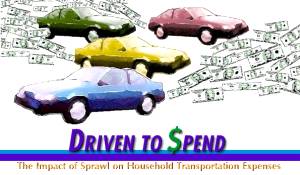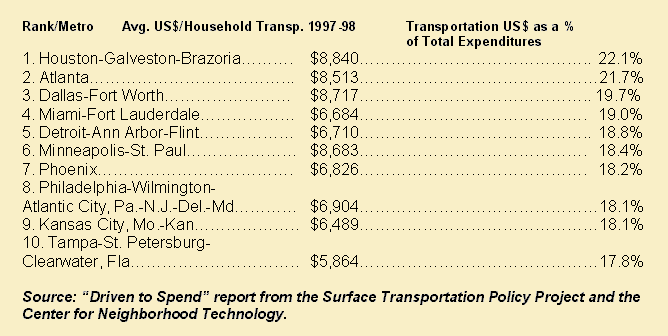|
Week of December 18, 2000 Snapshot from the Field |
|
Proposals Could Have Big Real Estate Impact
By JACK LYNE • Site Selection Executive Editor of Interactive Publishing
So says "Driven to Spend," a report compiled by two advocacy groups, the Surface Transportation Policy Project (www.transact.org) and the Center for Neighborhood Technology (www.cnt.org).
The report quantified household spending for transportation in 28 U.S. major metro areas, using government data from 1997 and 1998. An average of 18 percent of the household budgets in those metros was spent on transportation. That was "more than is spent on health care, education or food," the study said. In some metros, transportation costs outstripped housing costs.
The 18 percent average marks an 8 percent increase between 1990 and 1998, according to the report.
The culprit, the report contends, is urban sprawl.
"Transportation has gotten expensive for many American families. Because of sprawl, driving has changed from a convenient choice into an expensive necessity," said Roy Kienitz, executive director of the Surface Transportation Policy Project, an advocacy group promoting "diversified transportation."
The metro-specific quantification of "Driven to Spend'" may stir up considerable attention.
The study, for example, ranked Houston the highest-cost metro, with an average of 22.1 percent of every household dollar spent on transportation. That, according to the study, translated into US$8,840 spent a year for transportation for the average Houston-area household, $2,528 more than the national average. Atlanta, with a transportation outlay of 21.7 percent, was the only other metro with an average above 20 percent. (See accompanying chart of the study's 10 most expensive metros.)
Such bottom-line specificity could conceivably carry considerable weight with advocacy groups and government officials. And that adds heft to the report's broad-ranging series of recommendations. If implemented, some of those proposals could have substantial impact within the real estate industry.
"Driven to Spend's" recommendations include:
However ambitious, those are only proposals, it bears repeating. Still, the study's thoroughgoing approach could give its findings some long-lasting policymaking clout.
Other findings from "Driven to Spend" include:
©2000 Conway Data, Inc. All rights reserved. Data is from many sources and is not warranted to be accurate or current.
|
 America's ironclad love affair with the automobile comes at a high cost, according to a newly released report. In several U.S. metros, in fact, transportation costs are eating up more than 20 percent of household budgets.
America's ironclad love affair with the automobile comes at a high cost, according to a newly released report. In several U.S. metros, in fact, transportation costs are eating up more than 20 percent of household budgets.
 Report Aims to Quantify
Report Aims to Quantify